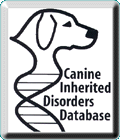
Severe combined immunodeficiency (SCID)
SCID is the most severe of the inherited immunodeficiency disorders. As the name implies, there is defective development of all components of the immune system. Pups are affected at a very young age, and are susceptible to a variety of infections.
This is an X-linked recessive trait. This means only males are clinically affected. However females can carry the trait and there is a 50% chance they will pass it to their male offspring.
Pups are usually affected by 3 weeks of age with problems like diarrhea, skin and ear infections, and respiratory infections - all of which respond poorly or not at all to antibiotics. These pups have stunted growth and most will die by 3 or 4 months, of severe bacterial or viral infections (commonly distemper). Male siblings of affected pups may have died of "fading puppy syndrome" or other vague conditions.
This disorder is uncommon. Your veterinarian may begin to suspect an immune defiency when your pup has recurring illnesses that are very difficult to treat. Laboratory tests will help with the diagnosis.
In affected people, the only successful treatment for this disorder is a bone marrow transplant which at present is not technically practical in dogs.
Secondary infections are treated as required, but there is generally a poor response.
Lab tests show normal numbers of circulating B lymphocytes and variable IgM, but low to absent IgG and IgA. There are low to normal numbers of circulating T lymphocytes, which are non-functional.
On post-mortem, these dogs have a very small, dysplastic thymus and a profound lymphoid hypoplasia. (It may be difficult to detect any lymph nodes).
Recent genetic sequencing has located the specific defect, with the actual mutation varying with the breed. A genetics laboratory (if available) can test for the defect, but at present there is no commercial test.
The mother of an affected dog is a carrier of the disorder and should not be used for breeding. Female siblings, although clinically normal, have a 50% chance of being a carrier and should also not be used in breeding programmes.
FOR MORE INFORMATION ABOUT THIS DISORDER, PLEASE SEE YOUR VETERINARIAN.
Ackerman, L. 1999. The Genetic Connection: A Guide to Health Problems in Purebred Dogs. p. 100. AAHA Press, Lakewood, Colorado.
Felsburg, P.J. 1992. Primary immunodeficiencies. In J.D. Bonagura and R.W. Kirk (eds) Kirk's Current Veterinary Therapy XI Small Animal Practice p. 448-453. W.B. Saunders Co., Toronto.
- Disorder Type:

